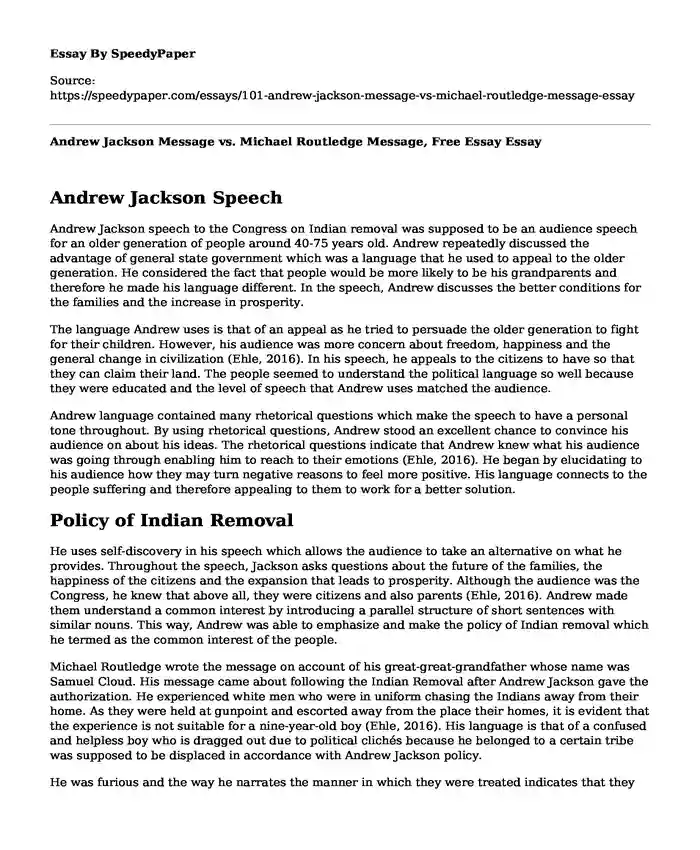
| Type of paper: | Essay |
| Categories: | Politics History Political science Andrew Jackson |
| Pages: | 3 |
| Wordcount: | 671 words |
Andrew Jackson Speech
Andrew Jackson speech to the Congress on Indian removal was supposed to be an audience speech for an older generation of people around 40-75 years old. Andrew repeatedly discussed the advantage of general state government which was a language that he used to appeal to the older generation. He considered the fact that people would be more likely to be his grandparents and therefore he made his language different. In the speech, Andrew discusses the better conditions for the families and the increase in prosperity.
The language Andrew uses is that of an appeal as he tried to persuade the older generation to fight for their children. However, his audience was more concern about freedom, happiness and the general change in civilization (Ehle, 2016). In his speech, he appeals to the citizens to have so that they can claim their land. The people seemed to understand the political language so well because they were educated and the level of speech that Andrew uses matched the audience.
Andrew language contained many rhetorical questions which make the speech to have a personal tone throughout. By using rhetorical questions, Andrew stood an excellent chance to convince his audience on about his ideas. The rhetorical questions indicate that Andrew knew what his audience was going through enabling him to reach to their emotions (Ehle, 2016). He began by elucidating to his audience how they may turn negative reasons to feel more positive. His language connects to the people suffering and therefore appealing to them to work for a better solution.
Policy of Indian Removal
He uses self-discovery in his speech which allows the audience to take an alternative on what he provides. Throughout the speech, Jackson asks questions about the future of the families, the happiness of the citizens and the expansion that leads to prosperity. Although the audience was the Congress, he knew that above all, they were citizens and also parents (Ehle, 2016). Andrew made them understand a common interest by introducing a parallel structure of short sentences with similar nouns. This way, Andrew was able to emphasize and make the policy of Indian removal which he termed as the common interest of the people.
Michael Routledge wrote the message on account of his great-great-grandfather whose name was Samuel Cloud. His message came about following the Indian Removal after Andrew Jackson gave the authorization. He experienced white men who were in uniform chasing the Indians away from their home. As they were held at gunpoint and escorted away from the place their homes, it is evident that the experience is not suitable for a nine-year-old boy (Ehle, 2016). His language is that of a confused and helpless boy who is dragged out due to political clichés because he belonged to a certain tribe was supposed to be displaced in accordance with Andrew Jackson policy.
He was furious and the way he narrates the manner in which they were treated indicates that they were not shown any mercy as the white men forced the nine-year-old boy to walk at nights in the cold mountains. Michael claimed that after being held by his mother on their way to the mountains, he felt safe (Ehle, 2016). Michael grieffully narrates his demise when he was displaced from a place he called home just because he belonged to the Cherokee tribe. His language is full of fear and sadness of the loss of a home and the torture of not having a normal life, a chance to play and be able to see his friends.
The language used between Michael and Andrew is different since Andrew uses his self-discovery to appeal to the congress so that they can agree to the policy that would displace hundreds of Indians from their homes while Michael’s language is a concern, loss, and pain. To Michael, it was a trail of tears all along as they moved from one place to another.
References
Ehle, J. (2016). Trail of Tears. Spartacus Educational. Retrieved 21 March 2017, from http://spartacus-educational.com/WWtears.htm
Cite this page
Andrew Jackson Message vs. Michael Routledge Message, Free Essay. (2018, Apr 27). Retrieved from https://speedypaper.com/essays/101-andrew-jackson-message-vs-michael-routledge-message-essay
Request Removal
If you are the original author of this essay and no longer wish to have it published on the SpeedyPaper website, please click below to request its removal:
- Free Essay on Qualitative Data Analysis
- Essay Sample on the Impact of Mobile and Cloud Technology on Business
- Essay Sample: Autism Spectrum Disorder Industry Analysis
- Business Law Essay Example about Contracts
- Essay Example on Neoliberalism and Anarchism
- Mobile App for Diagnosing and Identifying Drugs for Animal Treatment. Free Essay
- Paper Example: Family News
Popular categories




